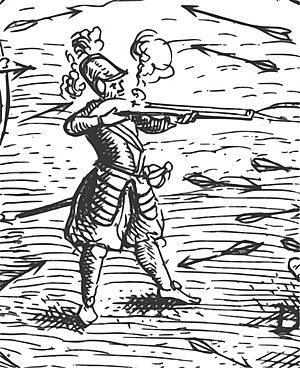Iroquois War (1609) facts for kids
Quick facts for kids Iroquois War |
|||||||
|---|---|---|---|---|---|---|---|
| Part of the Beaver Wars | |||||||
|
|||||||
| Belligerents | |||||||
| Iroquois | Algonquins, Montagnais, Huron | ||||||
| Commanders and leaders | |||||||
| Unknown | Samuel de Champlain, Iroquet and Ochateguin (Algonquins and Hurons) | ||||||
| Strength | |||||||
| Between 200 and 300 warriors, three chiefs or “captains” |
Between 60 and 100 warriors, formerly 300 who turned back 3 French arquebusiers, formerly 9 |
||||||
| Casualties and losses | |||||||
| Between 50 and 100 killed, 12 taken prisoner and tortured | Unknown, but no more than 20 | ||||||

In the summer of 1609, a French explorer named Samuel de Champlain wanted to make friends with the local native tribes. He formed alliances with the Wendat (also called Huron by the French), the Algonquin, and the Montagnais. These tribes lived near the Saint Lawrence River. They asked Champlain to help them fight their enemies, the Iroquois, who lived further south.
Champlain's Journey and the Battle
Champlain agreed to help. He set off with 9 French soldiers and 300 native warriors. They explored a river now called the Richelieu River. Champlain became the first European to map Lake Champlain.
Facing the Iroquois
As they traveled, many warriors turned back. They worried about going into enemy territory. This left Champlain with only 2 French soldiers and about 60 native warriors.
On July 29, they found a group of Iroquois. This happened on the western shore of what is now Lake Champlain. It was likely near the place that would become Fort Ticonderoga.
The Fight Begins
The battle started the next day. About 200 Iroquois warriors moved towards Champlain's group. One of Champlain's guides pointed out three Iroquois chiefs. Champlain used his arquebus, which was an early type of gun. He shot and killed two chiefs with one shot! One of his men killed the third chief.
After a lot of arrows were fired by both sides, the Iroquois turned and ran away. The Hurons and Algonquins chased them. They killed about fifty Iroquois warriors and captured twelve more.

